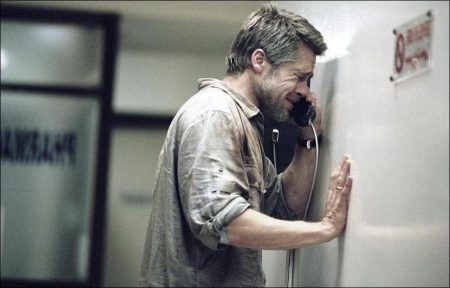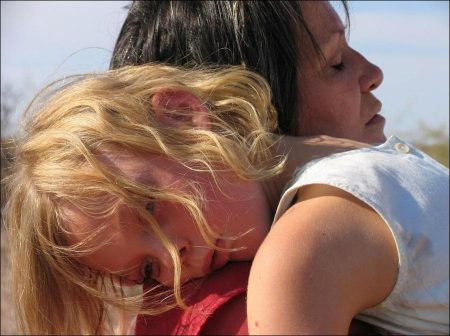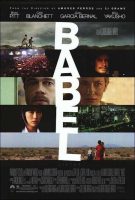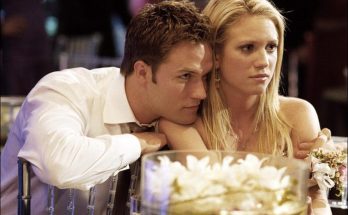Tagline: Listen.
Babel movie storyline. Armed with a Winchester rifle, two Morrocan boys set out to look after their family’s herd of goats. In the silent echoes of the desert, they decide to test the rifle… but the bullet goes farther than they thought it would.
Four interlocking stories connected by a single gun converge at the end to reveal a complex and tragic story of the lives of humanity around the world and how we truly aren’t all that different. In Morocco, a troubled married couple are on vacation trying to work out their differences.
Meanwhile, a Moroccan herder buys a rifle for his sons so they can keep the jackals away from his herd. A girl in Japan dealing with rejection, the death of her mother, the emotional distance of her father, her own self-consciousness, and a disability among many other issues, deals with modern life in the enormous metropolis of Tokyo, Japan. Then, on the opposite side of the world the married couple’s Mexican nanny takes the couple’s 2 children with her to her son’s wedding in Mexico, only to come into trouble on the return trip. Combined, it provides a powerful story and an equally powerful looking glass into the lives of seemingly random people around the world and it shows just how connected we really are.
In an instant, the lives of four separate groups of strangers on three different continents collide. Caught up in the rising tide of an accident that escalates beyond anyone’s control are a vacationing American couple, a rebellious deaf Japanese teenager and her father, and a Mexican nanny who, without permission, takes two American children across the border. None of these strangers will ever meet; in spite of the sudden, unlikely connection between them, they will all remain isolated due to their own inability to communicate meaningfully with anyone around them.
From Alejandro González Iñárritu comes a film that is at once intimate and epic, shot in four countries, cast with actors and non-actors, and concludes his trilogy that started with “Amores Perros” and “21 Grams.”
Babel is a 2006 drama film directed by Alejandro González Iñárritu and written by Guillermo Arriaga, starring an ensemble cast. The multi-narrative drama completes Iñárritu’s Death Trilogy, following Amores perros and 21 Grams.[2] It is an international co-production among companies based in the United States and Mexico. The film portrays multiple stories taking place in Morocco, Japan, Mexico and the US.
Babel was selected to compete for the Palme d’Or at the 2006 Cannes Film Festival, where González Iñárritu won the Best Director Award. It was later screened at the Toronto International Film Festival. The film opened in selected cities in the United States on 27 October 2006, and went into wide release on 10 November 2006. Babel won the Golden Globe Award for Best Motion Picture – Drama, and received seven Academy Award nominations, including Best Picture, Best Director, and two for Best Supporting Actress, winning for Best Original Score.
Released in seven theaters on 27 October 2006, and then released nationwide in 1,251 theaters on 10 November 2006, Babel grossed $34.3 million in North America, and $101 million in the rest of the world, for a worldwide box office total of $135.3 million, against a budget of $25 million. Babel is the highest-grossing film of González Iñárritu’s Death Trilogy (including Amores Perros and 21 Grams), both in North America and worldwide.
A Larger-Than-Life Film
Few times in film history have reality and fiction collided as they do in BABEL, Alejandro González Iñárritu¹s (“Amores Perros,” “21 Grams”) update of the Biblical myth that claims to be the origin of mankind’s lack of communication.
Shot over the course of a year in three continents and involving a ensemble multi-lingual cast lead by Brad Pitt, Cate Blanchett, Gael Garcia Bernal, and Koji Yakusho as well as a high percentage of non-professional actors from Morocco, Mexico and Japan, the film came to mean for all the people involved a physical and psychological journey very close to that portrayed by its characters. While the film tells the stories of people set adrift by cultural and idiomatic frontiers, both the director and his crew dealt with these same challenges months before the shooting started.
González Iñárritu, a self-claimed “director in exile,” has said that, first and foremost, the idea of BABEL is the result of having left his country and of his living-on-the-go current state of mind. “BABEL no longer answered the question, “Where am I from?” but rather, “Where am I heading?” Such was the personal approach to the question, that BABEL was in its origins a self-financed project.
In a departure from his two previous films, both shot in countries, settings and shooting conditions somehow manageable and familiar to the director, BABEL meant for González Iñárritu not only the deep involvement in a more complicated, emotional and intellectual journey, but a means of exploring other cultures and ways of seeing the world with a more complex film production. As is usually the case, the clashing of so many cultural points of view in both the ideological and in the physical ended up transforming not only his personal perspective on things but the creative process itself.
One of the director’s main objectives was to avoid using an outsider point of view in telling the stories of characters born and raised in the cities portrayed. In order to achieve that, he followed what he calls an “observe and absorb” process. Aside from carefully watching the everyday habits of the locals, he chose to work with foreign non-professional actors who provided him with insight on cultural subtleties. In the ultimate challenge of telling the story from the characters and not the director’s frame of mind, he let his first-time actors develop their own reactions to situations that might have a different meaning in every country. Many of them had never seen a film camera before.
Through the process of rehearsing highly emotional scenes in never spoken before languages and of finding the perfect shooting spot in places that ranged from a never ending desert to one of the most crowded cities in the world, BABEL came to prove its own plot thesis both in fiction and in real life: “Barriers and frontiers are not always physical and visible,” says González Iñárritu. “The lines are within us and prejudice exists within our cultural frames. In that same sense they can also be brought down.”
Such is the ordeal that the characters in the stories portrayed in Babel were meant to go through, and such was the life-changing experience of bringing those stories to the screen.
Continue Reading and View the Theatrical Trailer
Babel (2006)
Directed by: Alejandro González Iñárritu
Starring: Brad Pitt, Cate Blanchett, Gael Garcia Bernal, Koji Yakusho, Elle Fanning, Rinko Kikuchi, Adriana Barraza, Harriet Walter, Mohamed Akhzam, Wendy Nottingham
Screenplay by: Guillermo Arriaga
Production Design by: Brigitte Broch
Cinematography by: Rodrigo Prieto
Film Editing by: Douglas Crise, Stephen Mirrione
Costume Design by: Gabriela Diaque, Miwako Kobayashi, Michael Wilkinson
Music by: Gustavo Santaolalla
MPAA Rating: R for violence, some graphic nudity, sexual content, language.
Distributed by: Paramount Vantage
Release Date: November 10, 2006
Views: 177






